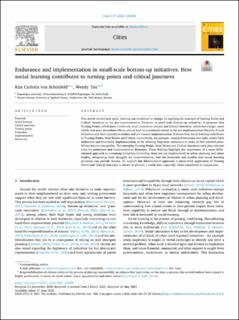Endurance and implementation in small-scale bottom-up initiatives: How social learning contributes to turning points and critical junctures
Peer reviewed, Journal article
Published version
Permanent lenke
https://hdl.handle.net/11250/2985484Utgivelsesdato
2021Metadata
Vis full innførselSamlinger
- Import fra CRIStin [3600]
- Institutt for byggfag [273]
Originalversjon
von Schönfeld, K. C., & Tan, W. (2021). Endurance and implementation in small-scale bottom-up initiatives: How social learning contributes to turning points and critical junctures. Cities, 117:103280. 10.1016/j.cities.2021.103280Sammendrag
This article studies how social learning can contribute to change, by applying the concepts of Turning Points and Critical Junctures to the pre-implementation lifecycles of small-scale bottom-up initiatives. It proposes that Turning Points, which have a relatively small immediate impact, and Critical Junctures, which have larger, more visible and more immediate effects, should both be considered crucial to the pre-implementation lifecycle of such initiatives and their capacity to endure and act towards implementation. It shows how social learning contributes to Turning Points, Near Misses and Critical Junctures by, for example, turning frustrations into spite, which fuels endurance and eventually implementation; or by allowing long-term endurance to make at first rejected possibilities become acceptable. The emerging Turning Points, Near Misses and Critical Junctures each play relevant roles for endurance and implementation dynamics. These findings highlight the importance of a more differentiated approach to bottom-up initiatives (including those not yet implemented) in urban planning and urban studies, recognizing their struggles for implementation, and the potentials and hurdles that social learning processes can provide therein. To support this differentiated approach, a micro-level application of Turning Points and Critical Junctures is shown to provide a useful lens, especially when considered in conjunction.

